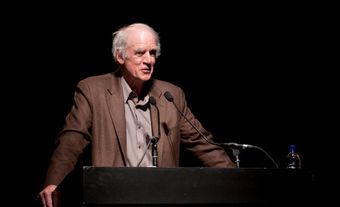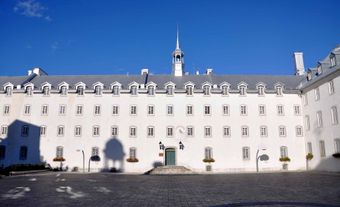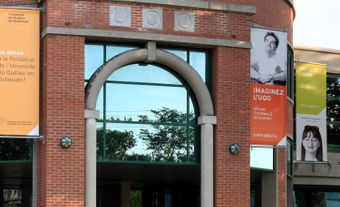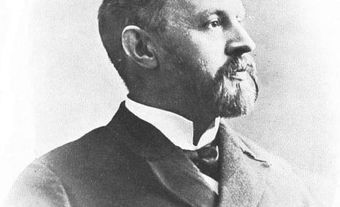Gérard Bouchard, Québécois historian and sociologist, internationally renowned public intellectual (born 26 December 1943 in Jonquière, Quebec). His work covers a variety of topics, namely nationalism, collective identity and imaginary, the Québécois society and diversity management. In 2007-2008, Bouchard and philosopher Charles Taylor co-chaired the Consultation Commission on Accommodation Practices Related to Cultural Differences in Quebec.

Gérard Bouchard
Photo: avec la permission de Eric Lanthier, Flickr.
Education and career
Born into a modest family in Lac-Saint-Jean, Gérard Bouchard is the son of Philippe Bouchard and Alice Simard.
He obtained a bachelor’s degree from the Collège de Jonquière. Afterwards, he studied history and sociology at the Université Laval, where he met political scientist Léon Dion and sociologist Fernand Dumont, among others. He received his master’s degree in sociology in 1968.
Bouchard earned his doctorate at the Paris Nanterre University (formerly named Paris X Nanterre). In 1972, he published his thesis entitled Le village immobile : Sennely-en-Sologne au XVIIIe siècle (18th century Sennely-en-Sologne: The village that stood still).
In his practice, Gérard Bouchard integrated methods from several disciplines to reconstruct the complex dynamics which form behaviours. Thus, he readily explored demography, ethnology, human genetics, biochemistry, epidemiology, computer science and law.
In 1971, he became a professor at the brand new University of Quebec in Chicoutimi.
He immediately started building BALSAC, a computerized database on the population of Saguenay and, in 1976, founded the Société de recherche sur les populations (SOREP). Completed in 1986, the database enables one to trace the history of families and individuals from the region by accessing the civil-status records which marked the main events of their lives.
Recognizing the results’ pertinence, Bouchard continued to expand BALSAC. Today, the database covers the entirety of Quebec’s territory from the 17th century to the contemporary period. This vast infrastructure contains records about almost five million individuals and facilitates many types of comparative analyses.
In the meantime, the SOREP developed into an interuniversity research group. In 1994, it was renamed and became the Institut interuniversitaire de recherche sur les populations (IREP), uniting several large Québécois universities.
Bouchard’s career spans half a century, during which he produced some 40 books and published close to 300 papers on various themes, including: social mobility, family reproduction systems, popular rituals, the evolution of fertility, the transformation of rural societies, the demogenetics of inherited diseases, collective identities, the emergence of nations and nationalism in the New World societies, thought structures, social myths, collective imaginaries, management models for ethnocultural diversity, and the cultural foundations of the European Union.
Intellectual contributions
Gérard Bouchard’s work can be divided into six main areas of focus:
Thoughts on the emergence of new societies in settlements and the transition between capitalism and farming culture. Bouchard’s interdisciplinary use of the BALSAC database shaped his research on human genetics. He published Histoire d’un génome in 1991, then Quelques arpents d’Amérique in 1996, the culmination of a quarter century’s research on the Saguenay population.
Comparisons drawn between Québec and other new communities originating from European empires. In Genèse des nations et cultures du Nouveau Monde (2000), Bouchard evaluates the original society’s efforts to extend itself and the distance it takes in its discursive practices, leading to the creation of a collective imaginary. According to the author, members of the Québécois elite have not dissociated from the « Old World » to the same extent as elite groups from communities in the United States or Latin America.
Studies on collective imaginaries. Bouchard’s works on Saguenay and new communities highlight the contradictions and distortions present in the national imaginaries. In Raison et déraison du mythe (2014; trad. Social myths and collective imaginaries, 2017), the author explores how an idea evolves into myth before widely spreading into belief.
Observations on the symbolic foundations of the social relations within the European Union. Bouchard claims that the European Union’s failure to develop the symbolic foundations shared among its members has heightened the persistence of national and regional identities, often obscured by the founders of the EU.
Influence on public policies. Gérard Bouchard’s thoughts on diversity integration models have played an important role in Quebec. The consultations held by the Consultation Commission on Accommodation Practices Related to Cultural Differences (2007-2008) facilitated the consideration of multiple subjects: the perception of self and others, identity strategies, memory building and sometimes contradicting myths and symbols. The importance of a common public culture is at the heart of Bouchard’s understanding of interculturalism and of the Québécois model for diversity management. Deposited in 2017, the Policy on Québec Affirmation and Canadian Relations, entitled Quebeckers, Our Way of Being Canadian, integrates many of Bouchard’s reflections. The Policy advocates the systemization of the interculturalism model as a project to build and affirm the Québécois identity.
Novels. Mistouk (2002), Pikauba (2005) and Uashat (2009) cover similar topics: myths about the New World, the wonder of large spaces, encounters with Indigenous peoples and the feeling of incompletion. However, in novel form, Bouchard invites his readers to hear ordinary people speak of their dreams in their own language.
Awards and recognition
From 2002 to 2017, Gérard Bouchard was Canada Research Chair in Comparative Dynamics of Collective Imaginary.
He was also the associate chief scholar at the École des hautes études en sciences sociales in Paris in 1999 and a visiting professor at Harvard University in 2008-2009, where he was the William Lyon Mackenzie King Chair for the Canadian studies program.
For his contributions to knowledge, Bouchard was awarded the Jacques-Rousseau prize by the Association canadienne-française pour l'avancement des sciences (ACFAS) in 1985, the Léon-Gérin prize in 1993 and the Gérard-Parizeau prize in 2001. His book Quelques arpents d’Amérique (1996) won the Lionel-Groulx prize and the Sir-John-A.-Macdonald prize from the Canadian Historical Association. Genèse des nations et cultures du Nouveau Monde (2000) was selected for one of the Governor General’s Literary Awards. Bouchard received the French Legion of Honour (2002) and several honorary doctorates, namely from the University of Sherbrooke and the Laval University in 2015.
Since his retirement in 2017, Gérard Bouchard is an emeritus professor at the University of Quebec in Chicoutimi.
In his most recent book Les nations savent-elles encore rêver? (2019), Bouchard expresses his opinion that the Québécois dream is shrinking in the face of globalization, neoliberalism and migration. For a long time, this dream has been about asserting the independence of a small francophone society and participating in a bicultural federation. He believes that in Quebec, the Canadian project, both bilingual and multicultural, takes precedence as a model for morality, compassion and generosity.
Gérard Bouchard is the brother of Lucien Bouchard, lawyer, politician, founder of the Bloc québécois and Premier of Quebec from 1996 to 2001.

 Share on Facebook
Share on Facebook Share on X
Share on X Share by Email
Share by Email Share on Google Classroom
Share on Google Classroom







